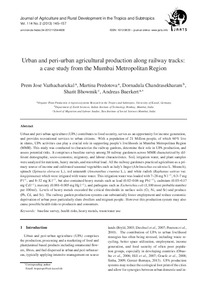| dcterms.abstract | Urban and peri-urban agriculture (UPA) contributes to food security, serves as an opportunity for income generation, and provides recreational services to urban citizens. With a population of 21 Million people, of which 60 % live in slums, UPA activities can play a crucial role in supporting people’s livelihoods in Mumbai Metropolitan Region (MMR). This study was conducted to characterize the railway gardens, determine their role in UPA production, and assess potential risks. It comprises a baseline survey among 38 railway gardeners across MMR characterized by different demographic, socio-economic, migratory, and labour characteristics. Soil, irrigation water, and plant samples were analyzed for nutrients, heavy metals, and microbial load. All the railway gardeners practiced agriculture as a primary source of income and cultivated seasonal vegetables such as lady’s finger (Abelmoschus esculentus L. Moench), spinach (Spinacia oleracea L.), red amaranth (Amaranthus cruentus L.), and white radish (Raphanus sativus var. longipinnatus) which were irrigated with waste water. This irrigation water was loaded with 7–28 mg N l^(−1), 0.3–7 mg P l^(−1), and 8–32 mg K l^(−1), but also contained heavy metals such as lead (0.02–0.06 mg Pb l^(−1)), cadmium (0.03–0.17 mg Cd l^(−1)), mercury (0.001–0.005 mg Hg l^(−1)), and pathogens such as Escherichia coli (1,100 most probable number per 100 ml). Levels of heavy metals exceeded the critical thresholds in surface soils (Cr, Ni, and Sr) and produce (Pb, Cd, and Sr). The railway garden production systems can substantially foster employment and reduce economic deprivation of urban poor particularly slum dwellers and migrant people. However this production system may also cause possible health risks to producers and consumers. | eng |

